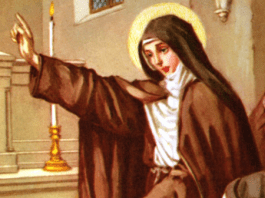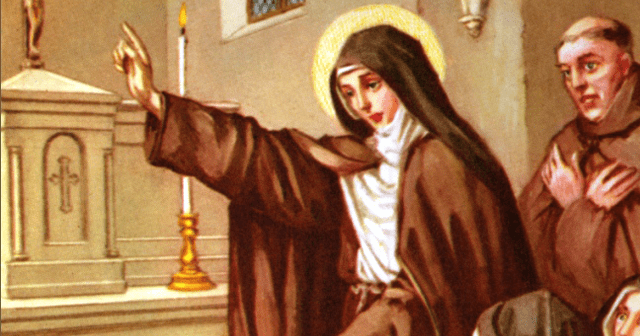
Saint Colette, born in 1381 to a carpenter named DeBoilet in Corby Abbey, Picardy, France, embarked on a remarkable journey of faith and reform after being orphaned at seventeen. Choosing to distribute her inheritance among the poor, she joined the Franciscan tertiaries and adopted a solitary life within Corby Abbey.
Her life took a transformative turn following visions of Saint Francis of Assisi, who commanded her to restore the Rule of Saint Clare to its pristine strictness. Initially hesitant, Colette was struck by a temporary blindness followed by muteness, each lasting three days. She interpreted these afflictions as divine signals to pursue her calling.
Faced with initial resistance when she tried to share her mission, Colette realized the need for authoritative support. Thus, she undertook a humble pilgrimage to Nice, France, to seek the endorsement of Peter de Luna, recognized by the French as Pope Benedict XIII despite the ongoing schism. Impressed by her conviction, he ordained her as a Poor Clare and granted her the authority to oversee the reformation and establishment of convents for the Minoresses, as well as to act as a missioner to Franciscan friars and tertiaries.
Colette’s journey was fraught with challenges, including opposition, defamation, and even accusations of sorcery. Despite these hurdles, she found success and support, notably in Savoy, which became a stronghold for her reformist efforts. Her reforms eventually spread to Burgundy in France, Flanders in Belgium, and even Spain.
In collaboration with Saint Vincent Ferrer, Colette played a pivotal role in resolving the papal schism. Her foundational efforts led to the creation of seventeen convents, and the establishment of the Colettine Poor Clares, a branch of the Poor Clares that adheres to her strict reforms, which include extreme poverty, barefootedness, and the observance of perpetual fasting and abstinence.
Renowned for her profound devotion to Christ’s Passion and her compassionate care for animals, Colette’s spiritual practices included fasting every Friday in meditation on the Passion and experiencing hours-long ecstasies after receiving Holy Communion. She even predicted her own death, underscoring her deep spiritual insight.
The Colettine Sisters, a testament to Colette’s enduring legacy, continue her work beyond France in countries such as Belgium, Germany, Spain, England, and the United States. Saint Colette was beatified on January 23, 1740, and canonized on May 24, 1807.
Photo credit: RickMorais via Wikimedia Commons
The post Saint Colette appeared first on uCatholic.
Daily Reading
Friday of the First Week in Ordinary Time
Reading I 1 Samuel 8:4-7, 10-22a All the elders of Israel came in a body to Samuel at Ramahand said to him, “Now that you are old,and your sons do…
Daily Meditation
What Does God Want From Us?
Click here for daily readings There have been many times in my life when the feelings of frustration and despair have overwhelmed me to the point that I looked upward…




